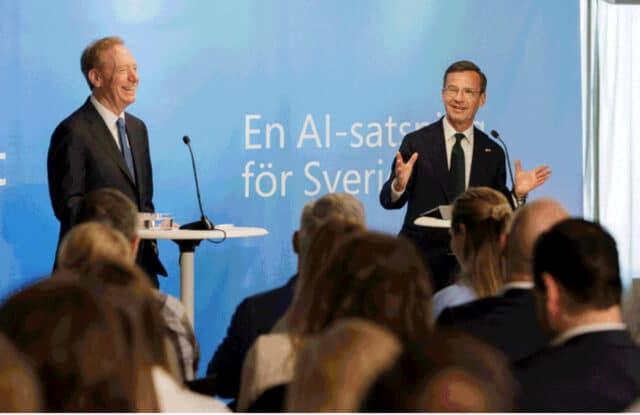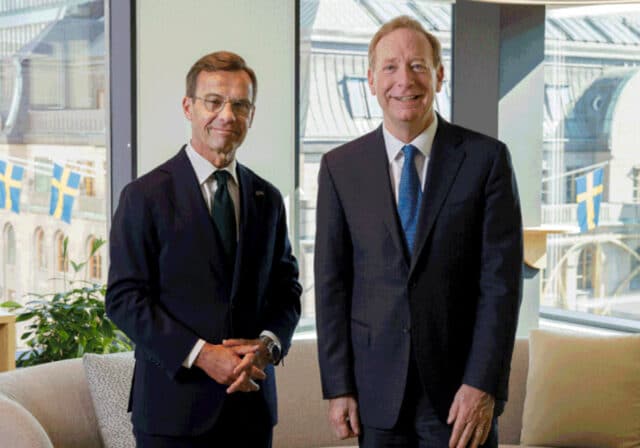Swede dreams are made of this: Microsoft unveils $3.5 billion AI investment in Sweden

In a historic move, Microsoft has unveiled its largest investment in Sweden, marking a significant commitment to bolster the nation's cloud infrastructure and AI capabilities.
The tech giant plans to invest a staggering 33.7 billion Swedish Kronor (approximately 3.5 billion USD) over the next two years, aiming to enhance Sweden's innovative edge, competitiveness, and resilience in the AI era.
Major Leap for Sweden's AI and Cloud Capabilities
Today, from its headquarters in Stockholm, Microsoft revealed the details of this monumental investment. The funds are earmarked for expanding Sweden's cloud infrastructure and integrating cutting-edge artificial intelligence technology. Additionally, Microsoft aims to elevate the AI proficiency of 250,000 Swedes, preparing the workforce for future challenges and opportunities.
The initiative is designed to accelerate Sweden's adoption of AI technologies, boosting long-term competitiveness and fostering sustainable economic benefits. "AI acts as a multiplier or catalyst, not just impacting how we run businesses but also accelerating progress across various technology fields," stated Swedish Prime Minister Ulf Kristersson during the announcement.

Expanding Local Infrastructure
As part of this investment, Microsoft will enhance its existing data centers in Sandviken, Gävle, and Staffanstorp, deploying 20,000 of the latest GPUs. This move aligns with the Swedish government's focus on innovation, competitiveness, and efficiency, particularly in the public sector, alongside national resilience and sustainability.
"Our investment in Sweden demonstrates our confidence in this nation, its government, and its potential as a leading player in the AI era," said Brad Smith, Vice Chair and President at Microsoft. "This announcement is about more than technology; it's a commitment to ensuring widespread access to the tools and skills necessary for Sweden's populace and economy to thrive in the AI era."
AI Competency for a Quarter Million Swedes
The rapid integration of AI across Swedish workplaces means that enhancing AI skills is more crucial than ever. Currently, 75% of Swedish white-collar workers utilize AI, with 46% having started in just the last six months. Microsoft's educational initiatives aim to catalyze innovation among startups and established companies alike, addressing the urgent need for AI skills development.
"To fully realize Sweden's potential, we must embrace AI to unlock new opportunities, streamline processes, and tackle complex challenges," noted Johannes Schildt, CEO at Kry. "Together with Microsoft, we are already seeing positive results in how AI reduces administrative tasks and enables our healthcare workers to better focus on patient care."

Promoting Responsible Progress and Community Engagement
This new infrastructure will operate under Microsoft's principles for equitable AI access, fostering innovation and fair competition within the burgeoning AI economy. Microsoft also introduced its global data center Community Pledge today, highlighting its commitment to responsible engagement in Sweden and worldwide.
"This pledge and our investment today affirm our commitment to Sweden, a country that has been a strong partner for many years," said Noelle Walsh, Corporate Vice President at Microsoft Cloud Operations & Innovation. "The work we have done together serves as a model for community partnership, with a commitment to sustainability that aligns so well with Microsoft's strategy."
Ensuring a Sustainable and Secure Infrastructure
The existing Swedish data center region benefits from Microsoft's sustainability investments, operating on 100% fossil-free energy. In a groundbreaking pilot with Saft, a subsidiary of TotalEnergies, Microsoft is also exploring the use of battery energy storage systems (BESS) to phase out fossil fuels, aiming for diesel-free data centers by 2030.
By merging capital investments with renewable energy initiatives, Microsoft not only secures its data centers against unauthorized access and environmental risks but also sets new standards in responsible AI practices. This comprehensive approach ensures the availability, security, and ethical use of AI technologies, promoting best practices across the industry.
